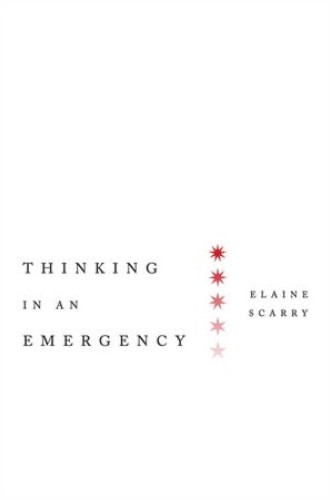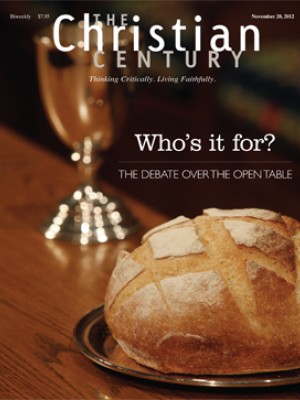Thinking in an Emergency, by Elaine Scarry
In the mid-20th century, Clinton Rossiter argued that one inevitable feature of the nuclear age is the state of “chronic emergency” in which we find ourselves. This forces us, he predicted, to cede ever more powers into the hands of our presidents and prime ministers, turning them into virtual monarchs. Chronic emergency causes us to surrender our democratic principals and turn over our capacities for critical thinking.
In this strange, insightful and layered little book, Elaine Scarry argues that Rossiter was absolutely right. Nuclear weapons are “monarchical weapons” that threaten the very essence of democracy. We need changes in our habits of thinking and acting that will either eliminate nuclear weapons or render them irrelevant. Thinking in an Emergency is only three chapters long—more of a long essay than a book—but its length means that you might consent to reading and absorbing the argument—and letting it trouble you.
Read our latest issue or browse back issues.
One of the threats of nuclear weapons is that they concentrate decision making into the hands of a very few. The United States has set up a system in which the president has his singular finger on the nuclear button. Only he can choose when to use the nation’s nuclear capacity. This is, in Scarry’s view, the great threat of the nuclear age: we come to believe that certain decisions that effect all of us very intimately are best made by one person alone. That is a form of fascism and a fundamental threat to our democracy.
“The claim of emergency,” Scarry writes, “and the momentum toward unconstrained executive power became increasingly legible” during the Bush presidency, “with a presidential office that sanctioned the practice of torture, detention without charge, widespread surveillance of its citizens, and a private mercenary army answerable only to the president.” But by no means does she lay blame at Bush’s feet alone. Every modern president has consolidated power in response to a sense of emergency.
The antidote to this form of fascism, in Scarry’s view, is a revaluation of a much-maligned and overlooked but essential force in democratic life: habit. Even a nuclear war, Scarry argues, is not a cataclysmic event but an accumulation of very particular habits—habits that are both mental and physical. Every day, “fourteen Ohio-class submarines—each carrying the equivalent of 4,000 Hiroshima bombs—are moving across the ocean floor without cessation, day in and day out.” There are patrols, protocols, specially trained military personnel and air- and land-based missile systems that constitute our society’s nuclear habits. All of these habits are directed at the making of nuclear war. They represent a vast and sophisticated system of preparedness—and yet virtually none of these preparations is directed at mitigating nuclear war’s effects or saving the population.
But humans have developed other very sophisticated forms of preparation that can be used to ward off harm and save populations in emergencies. Scarry offers four examples that she considers particularly instructive: CPR, mutual aid contracts, the Swiss shelter system and our own constitutional protections regarding the making of war. Each of these underscores the importance of habit in shaping human action.
CPR, for example, emphasizes the importance of both practice and repetition, and the significance of placing rescue skills into the hands of as many people as possible. The more people who have CPR training, the more likely the right person will be on hand in case of emergency. Mutual aid contracts work on the level of interlocking communities who agree to help one another in the event of fire or flood. These show that a very subtle system of preparedness can get very specific about who will do what, when and why. They allow for some brakes on rights and freedoms under particular circumstances for very short periods of time. They assume not a permanent state of emergency, but merely that there are times when lines of clear authority and responsibility need to be already in place.
The great force of Scarry’s rhetoric is saved for her final two examples. The Swiss have spent the last 60 years designing an extensive system of fallout shelters for their entire population—“all inhabitants”—as well as ritualized practices for safe-guarding precious artifacts that represent Swiss civilization and the Swiss way of life. These practices are spread throughout the population and routinely practiced. “Any Swiss man” can rehearse a very specific task that will be carried out in an emergency. The Swiss can rise to this level of performance because preparedness and collective thinking have been ingrained through habit.
What we in the United States have, by contrast, is a very extensive system of shelters that represents billions of dollars of investment to safeguard the executive branch only. But, Scarry points out, even getting the president from the White House to the utterly secretive and secluded Mount Weather will require the action of civil society. How will the president navigate clogged roads, for example, if people are not willing to pull over? Scarry notes that the government cannot practice these maneuvers because it would make their unfairness too obvious. This seems an apt observation.
On the other hand, her claim for what would happen if the U.S. did start to practice ways to get the president underground in the event of an emergency is too exaggerated to be believable. She argues that “the unjustness of the arrangement would become so vivid, it would no doubt increase the pressure to eliminate the country’s vast nuclear arsenal altogether, giving the United States (for the first time) a reasonable position from which to ask the rest of the world to abstain from obtaining such weapons.” It seems more likely that such exercises would lead to arguments about tying up traffic, but perhaps the underlying question of fairness would become more visible. Scarry’s exaggeration, however, points out the difference between our system and the Swiss system. In the Swiss system, an entire population and a civilization’s revered artifacts are preserved in exquisite detail. In the U.S. system, a few powerful people are preserved while everyone else has neither the “right to exit” nor even the “right to exist.”
Scarry next touches on the U.S. Constitution and its protections regarding war, which are based on the legal principle, “That which touches all requires everyone’s agreement.” Legislation, Scarry contends, is a form of national-level habit-shaping. Think of seat-belt laws or antitexting laws: we make laws to shape our behavior in very specific directions. War-making laws are among the most central of these because they are “the laws specifying the gates the people of the United States are obligated to pass through before they injure another population.”
But in the nuclear age, these safeguards have been largely ignored. We have eliminated the draft, which was intended to spread the risk of war across the entire population. Nuclear capability in certain ways negates the Second Amendment, which says that destructive capacities should not be concentrated in one set of hands. Instead, in a crisis, the population and Congress wait passively while the president and his cabinet announce a decision about whether to go to war.
Scarry believes that this passivity is shaped in part by our culture’s disdain for habit. We think of habit as the opposite of thought and deliberation, instead of as a very concentrated form of thought. We imagine that habits constrict our individual freedom. But habits play an absolutely essential role in the formation of the character of a person and of a nation. Whatever thinking we are doing now, in a nonemergency state, will be profoundly available to us in an emergency, for good or for ill. Scarry notes that in an emergency, the question is never whether habits will be brought to bear on our response, but which habits, and whether they will prove serviceable or unserviceable. “Habit yokes thought and action,” she writes.
Habit has two very different aspects, and to debate its merits, Scarry arranges sparring partners on either side: Montaigne and D. H. Lawrence argue that habit dulls the senses, makes us immune to the sensations of daily life and runs a mental rut so deep in our brains that we become insensible to what is actually happening around us. Aristotle, William James and Robert Venturi argue for the opposite: habit’s capacity to teach us how to see, how to feel and how to be aware. James writes, “Even the smallest stroke of virtue or of vice leaves its never so little scar.” Scarry argues that habit’s detractors miss this inevitability.
We will have habits; habits will have us. The question is whether we will shape and form our habits to a good end. And whether they will help us create coherent action both for the future of our democracy and in the time of emergency.







